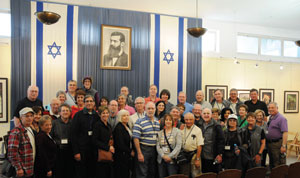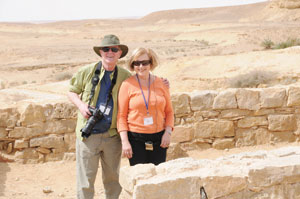 Forty-four members of the Jewish community returned from Israel early last week after taking part in the Jewish Federation of Greater Kansas City’s latest mission to Israel. No matter how many times the participant had visited Israel, it was a memorable trip.
Forty-four members of the Jewish community returned from Israel early last week after taking part in the Jewish Federation of Greater Kansas City’s latest mission to Israel. No matter how many times the participant had visited Israel, it was a memorable trip.
Federation President Bill Carr, who has been to Israel five times and four times in the past five years, said this trip made him feel closer to the Jewish people than ever. A Shabbat visit to the Wall, where he was able to pray alongside Jews of all denominations, especially made an impression on him.
Pete Levi, who has been to Israel six times, but not since 2000, said, “It’s easy to get renewed when you are in Israel.”
“Praying at the wall, being surrounded by fellow Jews from all around the world and seeing what they’ve done with the state of Israel is just a marvelous feeling,” he said.
First time visitor Susan Hammer, who was joined on the trip by her husband, Steve, “absolutely loved” visiting the Mahane Yehuda outdoor market in Jerusalem. A visit to Yad Vashem also made an impression.
“To be in Israel and to see the memorial for the high-minded Gentiles who risked their lives to save Jews is such a reminder of those heroic people,” she said.
But it was those extras that come with participating in a Federation mission that made her trip extra enjoyable. Hammer said they especially enjoyed traveling with Federation leaders, such as Executive Vice President and Chief Executive Officer Todd Stettner and Debbie Granoff, special campaigns projects director, who have been to Israel numerous times and were able to help guide the first-timers.
Levi said Federation trips are a great way to see Israel.
“It’s great to see what the Federation does for Israel, for communities and individuals in the country. The number of people who were there for the first time remarked about that at the end of the trip,” Levi said.
Many in the group, including the Hammers, were moved by a visit to Independence Hall in Tel Aviv, where Loeb Granoff read the group a letter he received in 1947 from his father, A.J. Granoff. The letter was about a visit that took place in Washington, D.C., between A.J, Eddie Jacobson and President Harry S. Truman. The purpose of their visit was to thank the president for his “contribution toward a Jewish state...”
“I was watching the faces of the young adults who were on a Birthright Israel trip who were listening to Loeb reading the letter and they were mesmerized by him,” Susan Hammer said. “It was truly something I will long remember.”
Hammer also enjoyed spending time with Trish Uhlmann. Uhlmann, who is on the board of the Joint Distribution Committee, who explained to some of the travelers “what Israel is dealing with socially, economically and politically.”
“It was most enlightening,” she said.
Politically speaking the Middle East is a hot zone right now, but Carr said the current tensions did not affect the travelers from Kansas City. In fact, when he asked several Israelis about the Egyptian situation, he learned that they believe the situation “will need to sit for about six months.” He said no one seemed alarmed at this time.
“I never felt any unease,” Carr said.
A vibrant economy A booming economy caught the attention of the Kansas Citians.
A booming economy caught the attention of the Kansas Citians.
“There are more construction cranes in Israel — everywhere, in Tel Aviv, Jerusalem — than I would guess are in Denver, Kansas City and Chicago. It looks like Israel is in good economic shape,” Carr said.
Levi was also struck by the economic vibrancy of the country.
“The modern buildings that we were in would rival anything in the United States. The economy seemed to be bustling, particularly compared to when I was there in 2000 right before the Intifada. You can really see the results of the growth of commerce and industry in Israel and the reinvestment in the state of Israel in the populated areas and in the cities,” Levi said.
Hammer, Levi and Carr were all impressed by a visit to the Ayalim Program, which is comprised of young Israeli men and women who want to continue giving back to Israel after they have completed their military service. They work in border regions, helping mentor young kids in the areas. The Federation group visited an Ayalim group in the Negev, where, Levi said, they are working together to bring the Negev into greater prosperity.
“It’s kind of like Obama’s internal peace corps,” Carr said.
The program is described as a student-run association that is a modern example of the pioneering spirit that helped build the state of Israel in its early days.
“We had lunch with these students. You can feel their energy and their enthusiasm for both the country and what they are doing,” Carr said.
Carr went to Ma›aleh School of Television, Film & the Arts in Jerusalem in Jerusalem and viewed short, student-made films about controversial issues in Israel. He found them enlightening and would recommend that they be shown here in Kansas City because he feels they would lead to good discussions. For instance one short film he saw focused on the problem Israel is facing with illegal immigrants from the Philippines.
“Many of them serve as inexpensive helpers for the elderly,” he said. “In the end the elderly Jew protected the Filipino from detection by the police. It was interesting and it’s an issue I knew nothing about.”
Quality medical care
Hammer was also impressed by the Assaf HaRofeh Medical Center, which is affiliated with the School of Medicine at Tel Aviv University as was Levi. Unfortunately after the official visit, the Levis saw the hospital from a patient’s point of view.
Levi explained that it was raining the day of that visit and his wife, Enid, slipped and fell in the parking lot and hit her head on the pavement. At the time the Levis were in two different groups, so he wasn’t close to his wife. Two bystanders, who happened to be Arab, stopped to help her and drove her back to the hospital.
“We witnessed some really outstanding, high-quality medical care,” Levi said. “She had a CT scan and full blood work and an EKG and was seen by a whole team of doctors and nurses. She’s fine now and all healed.”
Besides what he called extraordinary care, he noticed that the hospital cared for a cross section of people, including immigrants, and “they were all given excellent care.” He was also surprised by how reasonably priced the care was for what amounted to a two-hour visit to the emergency room.
“I was handed a bill and I thought it said $968. I thought that’s pretty cheap in dollars, but actually it was shekels. So the total cost of the medical care was around $250,” he said.


